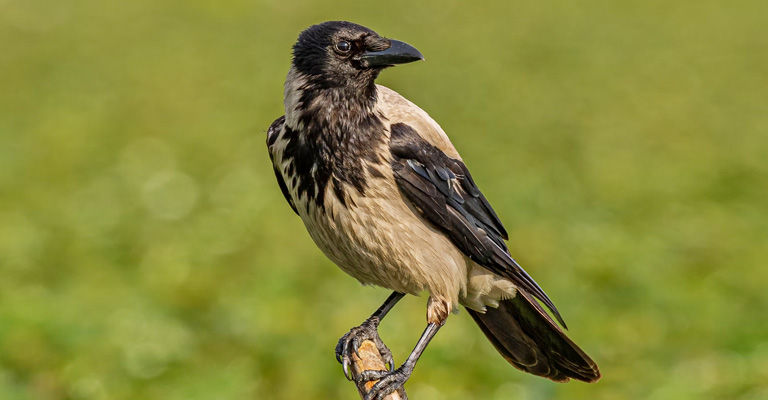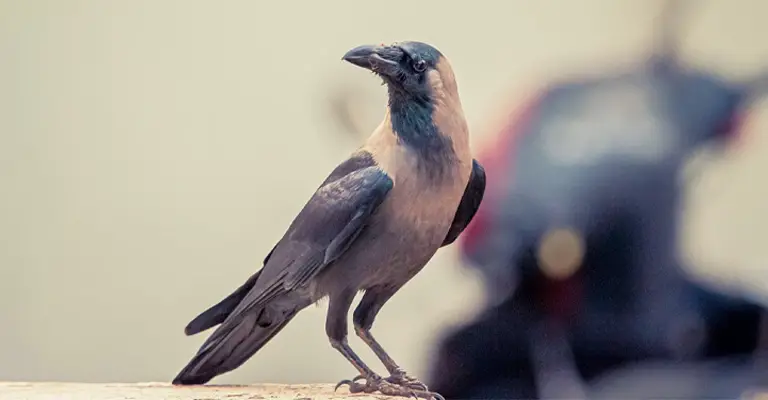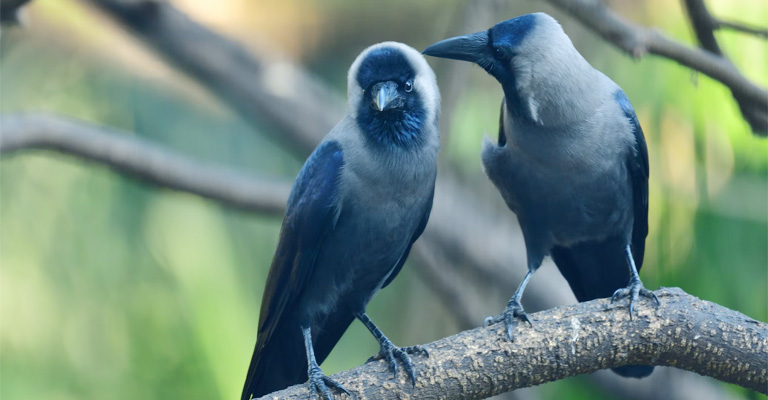Crows, those enigmatic and highly intelligent birds, have long captured our fascination. Yet, amidst their allure, there exists a perplexing question: Why is it illegal to own a crow?
These sleek, black-feathered creatures have been a source of myth, symbolism, and even companionship in some cultures. However, many regions around the world have imposed strict regulations against keeping crows as pets.
In this exploration, we delve into the complex interplay of ecological concerns, ethical considerations, and legal implications that surround the prohibition of crow ownership.
We’ll shed light on the ecological role of crows, the potential risks they pose as pets, and the ethical dilemmas faced by those who advocate for their protection.
By the end, you’ll gain a deeper understanding of the delicate balance between human fascination and the preservation of these remarkable birds in the wild.

Why Is It Illegal to Own a Crow?
Owning a crow has always intrigued some individuals, whether driven by a fascination with their intelligence or their association with mythology and folklore. However, in many parts of the world, owning a crow is illegal. Here’s why:
The Ecological Role of Crows
Crows, particularly the American crow (Corvus brachyrhynchos), play a significant ecological role in their habitats.
These highly intelligent birds are scavengers and omnivores, consuming a wide range of food, including insects, small mammals, fruits, and carrion.
This diverse diet makes them valuable in ecosystems by helping to control insect populations and cleaning up animal carcasses, reducing the risk of disease transmission.
In agricultural settings, crows can serve as natural pest control, helping to manage insect infestations that can damage crops. Their presence can be especially beneficial to farmers.
Moreover, they also help disperse seeds by eating fruits and then dropping the seeds in different locations, aiding in forest regeneration and plant diversity.
With these vital ecological functions in mind, the prohibition of crow ownership is often enacted to protect the populations of these birds in the wild. Captivity can disrupt their contribution to the balance of local ecosystems and reduce their populations.
Ethical Dilemmas of Crow Ownership
Crows are highly intelligent and social animals. Their ability to solve complex problems, recognize human faces, and even use tools has been well-documented. These cognitive abilities raise ethical questions about keeping them as pets.
In captivity, crows can become stressed and bored, leading to behavioral problems and health issues. Providing them with an environment that meets their mental and physical needs can be extremely challenging.
Furthermore, crows have complex social structures. They form tight-knit family groups and maintain intricate relationships within their communities. Disrupting these social bonds by keeping crows in captivity can lead to psychological distress for the birds.
The ethical concerns extend beyond the well-being of the crows themselves. Those who capture crows from the wild to keep them as pets contribute to the depletion of wild crow populations.
This practice can also disrupt local ecosystems by removing individuals that play a crucial role in pest control and seed dispersal.
Legal Framework and Regulations
The laws surrounding crow ownership vary from place to place, and in some regions, it is not explicitly illegal. However, even in areas where it’s not prohibited, there are often stringent regulations in place.
These regulations are primarily designed to ensure the well-being of the birds and protect their populations in the wild.
In the United States, for example, crows are protected under the Migratory Bird Treaty Act. This act prohibits the possession, sale, or transport of crows without the proper permits. Similar laws exist in many countries to safeguard these birds.
Some people might obtain permits to keep crows for educational or scientific purposes. In such cases, strict guidelines are in place to ensure that the birds are treated ethically and their welfare is a top priority.
However, obtaining these permits is typically challenging and reserved for specific circumstances.
Alternatives to Crow Ownership
For those who are drawn to the intelligence and beauty of crows, there are ethical and educational ways to interact with them without owning them.
Birdwatching, volunteering at wildlife rescue centers, or supporting organizations dedicated to crow conservation are all valuable ways to appreciate and contribute to the well-being of these remarkable birds.
Additionally, leaving out food and water for wild crows can offer an opportunity to observe them up close without the ethical and legal concerns associated with keeping them in captivity.
However, it’s crucial to do this responsibly by providing suitable, crow-friendly food and maintaining a safe distance to avoid habituating them to humans.
What Are the Laws Regarding Keeping Crows as Pets?

In the United States, keeping crows as pets is regulated by federal laws, primarily the Migratory Bird Treaty Act (MBTA) and other state-specific regulations. Here’s an overview of the key points:
Migratory Bird Treaty Act (MBTA)
Crows are protected under the MBTA, which is a federal law aimed at conserving migratory birds. The MBTA makes it illegal to possess, capture, sell, or transport crows without the necessary permits.
Permits
In some cases, individuals or organizations can obtain permits from the U.S. Fish and Wildlife Service (USFWS) to keep crows for educational or scientific purposes.
These permits are generally challenging to acquire and come with strict guidelines to ensure the welfare of the birds.
State Regulations
In addition to federal laws, individual states may have their own regulations regarding crow ownership. These can vary widely, from outright prohibitions to specific permit requirements. It’s essential to research and comply with your state’s regulations.
Wildlife Rehabilitation
Licensed wildlife rehabilitators may be permitted to care for injured or orphaned crows with the goal of releasing them back into the wild. However, these individuals must have the appropriate licenses and adhere to specific care standards.
Ethical Considerations
Even if you can legally own a crow under the applicable permits and regulations, it’s essential to consider the ethical aspects. Crows are highly intelligent, social creatures, and keeping them as pets can pose significant ethical dilemmas regarding their well-being.
State-specific regulations can further affect the legality of crow ownership. However, permits for educational or scientific purposes are challenging to obtain, and ethical concerns should be a significant factor in any decision related to keeping crows as pets.
Why Are Crows Not Suitable Pets?

Crows, with their striking intelligence and intriguing behaviors, might seem like appealing pets to some, but in reality, they are not suitable for domestication. There are several compelling reasons why crows should not be kept as pets:
High Intelligence
Crows are among the most intelligent birds on the planet. Their cognitive abilities are on par with some primates and dolphins. They can solve complex problems, recognize human faces, use tools, and even hold grudges.
This high level of intelligence makes them ill-suited for life in captivity. They require mental stimulation and environmental enrichment that is difficult to provide in a home setting.
Social Nature
Crows are highly social birds, living in tight-knit family groups and forming complex relationships within their communities.
In captivity, they are often isolated, leading to loneliness and stress. Keeping a crow as a pet disrupts their natural social bonds and can result in psychological distress.
Ethical Concerns
Owning crows as pets raises significant ethical dilemmas. These birds are wild animals that should have the opportunity to live free in their natural habitat.
Capturing them from the wild or breeding them for the pet trade contributes to the depletion of wild crow populations. This practice can disrupt local ecosystems by removing individuals that play a crucial role in pest control and seed dispersal.
Health and Welfare Issues
Crows have specific dietary and environmental needs that can be challenging to meet in a domestic setting. In captivity, they may suffer from boredom, stress, and malnutrition.
Providing an appropriate diet, mental stimulation, and physical activity can be extremely difficult, and these challenges can lead to health problems in pet crows.
Long Lifespan
Crows are known for their relatively long lifespans, often reaching up to 20 years in the wild. Taking on the responsibility of caring for a crow means committing to its well-being for a significant portion of your life.
This long-term commitment is often underestimated by those who attempt to keep crows as pets.
Legal Restrictions
In many regions, owning crows is illegal or heavily regulated. Laws such as the Migratory Bird Treaty Act in the United States make it illegal to possess, capture, or transport crows without the necessary permits.
Obtaining these permits is typically challenging and limited to specific circumstances, such as educational or scientific purposes.
Risk to Humans
Crows are wild animals and may exhibit unpredictable behaviors when kept in captivity. Their sharp beaks and talons can pose risks to human caregivers.
Additionally, crows may become more aggressive or stressed when they feel threatened, potentially leading to conflicts in a household.
FAQs
Can I legally own a crow as a pet?
In the United States, owning a crow as a pet is subject to strict regulations under the Migratory Bird Treaty Act. This act generally makes it illegal to possess crows without the necessary permits.
Are there any alternatives to owning a crow as a pet?
Instead of keeping crows as pets, individuals can explore various alternatives. These include birdwatching to appreciate crows in their natural habitat, volunteering at wildlife rescue centers, or supporting organizations dedicated to crow conservation.
What are the ethical concerns with keeping crows as pets?
There are significant ethical concerns associated with crow ownership. Crows are highly intelligent, social creatures with complex cognitive abilities. Captivity can lead to loneliness, stress, and behavioral problems. Moreover, owning crows may contribute to the depletion of wild populations, disrupting local ecosystems.
Are there any risks to humans when keeping crows as pets?
Yes, there are potential risks when keeping crows as pets. These birds are wild animals and may exhibit unpredictable behaviors in captivity. Their sharp beaks and talons can pose risks to human caregivers.
What is the lifespan of a crow in captivity?
The lifespan of a crow in captivity can vary but is generally shorter than in the wild. In their natural habitat, crows can live up to 20 years or more. However, in captivity, they may experience health issues due to difficulties in meeting their dietary and environmental needs.
Conclusion
The prohibition on owning crows is a multifaceted issue, rooted in ecological, ethical, and legal factors. Crows play a crucial role in ecosystems, aiding in pest control and maintaining balance in nature.
Their complex social structures and high intelligence make them unsuitable as pets, often resulting in harm to both the birds and their human owners.
Furthermore, the restrictions on crow ownership are in place to protect the welfare of these creatures, ensuring they remain in their natural habitats. This raises essential ethical questions about our responsibility to coexist harmoniously with wildlife.
As we’ve seen, the question of why it’s illegal to own a crow is not merely a matter of legal regulation; it’s a reflection of our society’s commitment to wildlife conservation and responsible stewardship.
By respecting these laws and appreciating crows from a safe distance, we can contribute to the preservation of these remarkable birds and the delicate ecosystems they inhabit.